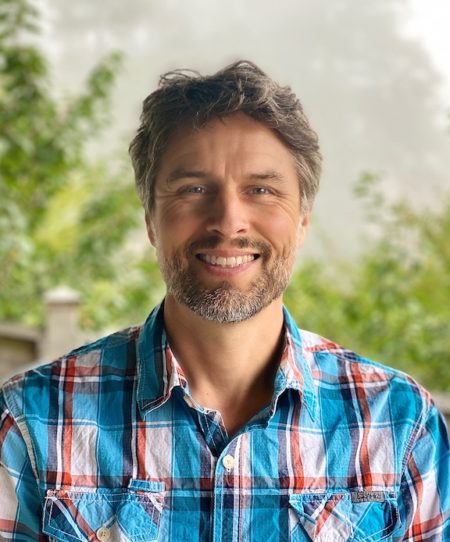
At this year’s ALS User Meeting, Tom Scarvie, head of the ALS Operations Group, was honored with the 2020 Tim Renner User Services Award. The ALS Users’ Executive Committee selected Scarvie “for coordinating all accelerator and beamline floor operator activities to provide reliable light to users safely.”
Scarvie came to the ALS in 1996 soon after graduating from UC Berkeley. In his last semester he took a class on x-ray physics taught by David Atwood, the first ALS scientific director. The course included a tour of the ALS, and when Scarvie saw a job posting for an ALS operator, he jumped at the chance. After a while he started asking the Accelerator Physics Group if he could take over some small tasks, and eventually he joined the group as a scientific engineering associate.
“I came in through a different route than most of the people in the group,” Scarvie said, “but over time I just became fascinated with the technology and also the physics behind controlling particles as they travel around at the speed of light.” Eventually, Scarvie moved up into his current role of supervisor of the Operations Group.
Although the accelerator itself intrigues Scarvie, “Supporting the researchers in developing their science is really one of the joys of the job,” he said. “It’s very gratifying to enable cutting-edge science that has so much societal benefit, and also just building on the knowledge of the human race and the scientific advancements we’ve made is very rewarding.”
Although Scarvie spends much of his time focused on the machine, he encourages dialogue with the users. “Sometimes they’ll get funny-looking data on their experiments and don’t ever think it might be the accelerator instead of their experimental setup,” he said. “Come to the control room. The operators may not be able to answer the questions, but we know immediately who to go to to get the right answer.”
His efforts are appreciated by users. “Tom’s availability, courtesy, pragmatism, and friendly approach are well known on the ALS floor,” said Carolyn Larabell, director of the National Center for X-Ray Tomography. “He’s always ready, when possible, to extend operation when a user comes to the control room asking for those additional hours that would allow them to complete a measurement.”
The sentiments were echoed by Fernando Sannibale, ALS deputy for accelerator operations. “Tom systematically optimizes operation activities by simplifying and minimizing as much as possible the workload on beamline scientists and users, while maintaining the rigorous attention required for a reliable and safe operation. This is a difficult balance to achieve, and Tom is really a master in this,” he said.
It’s also worth noting that the last twelve months have not exactly been business as usual for the ALS. “It is not an easy task to coordinate and shut down a facility like the ALS in a safe and secure manner, and remarkably to resume operations in such a short time” said Marc Allaire, head of the Berkeley Center for Structural Biology, noting last fall’s series of PG&E public safety power shutoffs. “And of course now we are going through the time of the shelter-in-place and COVID-19. I am still amazed how the ALS was able to resume operations with a very limited number of staff, enabling critical research to be done on COVID-19 to stop this pandemic,” Allaire said.
Larabell agreed, noting that, “Under extraordinary and unprecedented conditions, Tom made sure ample beam was available for COVID-related experiments.”
“Not a month goes by where I’m not still kind of amazed that they give us the wheel of this amazing scientific instrument and trust us with keeping it working,” said Scarvie. When asked what a good day at the ALS looks like, he described two very different types of good days. “There’s a good day where everything is working perfectly and it’s very boring, and there’s a good day where something really complicated has failed and we need to fix it and collaborate to fix it,” he said. Let’s hope Scarvie has many more good days at the ALS, and that, for the users’ sake, they are mostly the boring type.
Tim Renner was a beamline scientist at the ALS whose battle with cancer cut short a career distinguished by a caring attitude and larger-than-life personality. This award recognizes the services of people across the ALS organization who have made outstanding contributions to the ALS user community.